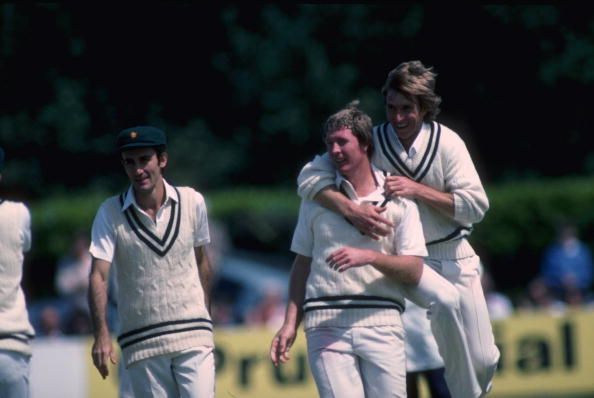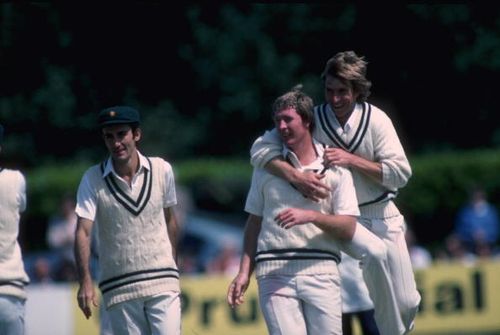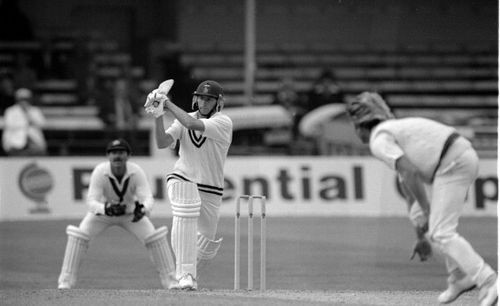
Most incredible matches in World Cup history: 8 - Zimbabwe vs Australia, 1983

“The way a team plays as a whole determines its success. You may have the greatest bunch of individual stars in the world, but if they don't play together, the club won't be worth a dime.” – Babe Ruth
In my rather interrupted career as a follower of cricket, never have I come across a quote that fits the Australian team of the early eighties to the letter. They did have a bunch of individual stars – the likes of Dennis Lillee, Jeff Thomson, wicket-keeper Rod Marsh, and new tearaway quicks Geoff Lawson and Rodney Hogg were enough to make rival lineups quake in their boots.
However, there was mutiny afoot among the first named; skipper Kim Hughes never quite garnered the support he deserved from the veterans. Moreover, there were quite a few members of the Kerry Packer circus in the side, and Australia did not look like a unified team at all. It showed in their selections itself – the final playing XI contained six southpaws. Clearly, something was wrong with their thinking processes.
Zimbabwe, on the other hand, had everything to gain and nothing to lose (as Napoleon Hill would put it) in their maiden appearance at the quadrennial extravaganza. For a nation which had gained independence from the UK three years previously, none of the members of the squad had ever participated in One-Day Internationals.
The final eleven, which would square off against the mighty Kangaroos in their first game, saw rise to perhaps the first instance where all the members were debutants in the limited-overs format at the World Cup. Talk about a trial by fire!
In true underdog style, though, the morning of 9 June 1983 would bring in a lot of surprises – one of which would go down in history as the greatest of upsets in the tournament. There was going to be a David – Goliath comparison, and for once, the old tale did come true.
Zimbabwe begin in awful fashion
Hughes won the toss and inserted the Zimbabweans in, hoping to take advantage of the early movement and moisture on offer at Trent Bridge. Ali Shah and Grant Paterson squared off against Lawson and Hogg – much to everyone’s surprise since the expectation would have been Lillee and Thomson going full throttle against the nervous debutants. But the strike pair were at the fag end of their illustrious international careers, and neither bowler was as quick as before.
Minor verbal spats between the maverick Lillee and Paterson resulted in nothing but hot air, and both willow wielders slowly stitched together a half-century stand. Thomson, he of the javelin-like whippy action, was extremely erratic – his first delivery rocketed away down the leg side for four wides.
For someone who had suffered three stress fractures of the lower back in 1973 and staged a remarkable comeback to become one of the world’s most feared bowlers, Lillee preyed on Shah’s frustration at playing the cut and drew him into attempting it again – Marsh diving forward to take the catch and completing yet another instance of ‘c Marsh b Lillee’.
The next ball, Paterson couldn’t keep the lofted drive down and was snapped up by David Hookes in the covers. To the Aussies’ collective dismay, Andy Pycroft successfully thwarted the hat-trick delivery.
Jack Heron, Zimbabwe’s only player to have faced off against some of the leading lights from down under in the league tourneys in England, combined with Pycroft to push the total towards the three-figure mark, before Allan Border removed the latter with one of his left-arm slow deliveries, and Graham Yallop removed Heron with the stocky Marsh scooping up yet another offering behind the stumps.
By lunch, the African side were tottering at 94/5, with skipper Fletcher and all-rounder Kevin Curran at the crease, and Dave Houghton back in the hut due to a controversial decision.
The grit shows, the tail wags and sloths begin to appear
Curran and Fletcher then set about executing the recovery job, with the captain growing in confidence with each passing moment. The duo ran singles hard, put away the occasional bad delivery, and racked up 70 runs in just 15 overs. Hookes then claimed a catch off the bowling of Rodney Hogg, but Curran and the others thought otherwise, even when the umpires declared him out. It took Fletcher’s calm, quiet yet firm tone to send him on his way.
Iain Butchart strode in, and after a nervous beginning, opened up with fearsome punches and drives. Fletcher also began finding the fence regularly, as the score began to climb. The highlight of this unbroken seventh-wicket partnership, which yielded 75 runs in the last 13 overs, was a remarkable stroke from Butchart off Thomson, straight back over his head. With that, Zimbabwe finished on 239/6 in their allotted 60 overs, and their leader had braved both a tricky pitch and the verbal duels the Aussies dished out to score an unbeaten 69.
Chasing 240 is now common place for nearly all the Test playing nations, and Australia’s powerful batting lineup was expected to ride roughshod over the hapless African nation. But the Zimbabwean skipper had other ideas. He decided to take on the six left-handed exponents of the blade by bringing on seamers Vince Hogg and Peter Rawson, exhorting them to bowl to a plan and maintain a leg-stump line.
The result – Aussie openers Kepler Wessels and Graeme Wood scored at a snail’s pace, and soon the asking rate began to rise sharply. The Australians were still playing the game as if it were a five-day Test match – Hughes wouldn’t have been happy in the dressing room.

The collapse, the last assault, and the final rites
Bringing himself on, Fletcher dismissed Wood with Houghton taking a fine catch behind the stumps. Four more deliveries later, he tricked his counterpart with a delivery that the Aussie skipper flicked uppishly towards square leg, only for Shah to conjure a brilliant, low-down catch close to the umpire. Suddenly the scoreboard read 63/2 and Zimbabwe began to sense that they could cause an unlikely event to occur – a win.
Vince’s injury forced Duncan to turn to the Egypt-born John Traicos, who responded to his skipper’s call with a miserly spell and nagging line, delivering his off-breaks in a containing fashion. He didn’t pick up any wickets, but was difficult to get away. Butchart, Rawson and Curran all played their part, but it was Heron’s athleticism that ran out the stubborn Wessels, who had been nudging everything in sight; he top scored with 76, even though Australia kept falling behind the run rate.
Soon, Hookes fell to a diving catch by Traicos off the Zimbabwean captain, while Gerald Peckover, coming in for the injured Vince, was a live wire on the field, saving runs by the dozens and increasing the frustration of the Aussies. Pycroft conjured two brilliant moments himself – a one-handed stunner to remove Yallop, giving Fletcher his fourth wicket, and then yet another to send back the entrenched Border.
Lawson followed soon after, but Marsh went on the offensive, attacking with impunity, smashing a couple of massive sixes. The West Australian keeper did everything in his power to get his side close, but a terrific last over from Rawson ensured that the Kangaroos finished 13 runs short.
The outcome of the game changed the entire nature of the tournament. Zimbabwe nearly caused another upset at Tunbridge Wells against eventual champions India, while Lillee, Thommo and Marsh retired a year after the tournament. The day was also remembered for Margaret Thatcher’s re-election as Britain’s Prime Minister, and the BBC strike definitely deprived many television viewers of the chance to witness the underdog’s triumph.